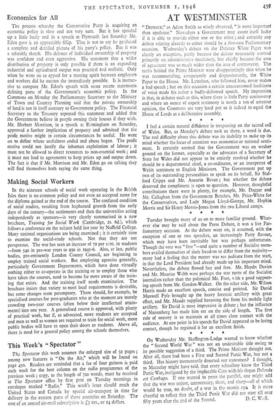AT WESTMINSTER
" DEFENCE," as Adam Smith so wisely observed, " is more important than opulence." Nowadays a Government may count itself lucky if it is able to provide either one or the other ; and certainly any debate relating directly to either should be a first-rate Parliamentary occasion. Wednesday's debate on the Defence White Paper was clearly an exception, partly because the debate necessarily centred primarily on administrative machinery, but chiefly because the area of agreement was so much wider than the area of controversy. The ranks behind the Prime Minister were disappointingly thin when he was recommending, competently and dispassionately, the White Paper to the House. Mr. Lyttelton, who followed him, never makes a bad speech ; but on this occasion a certain unaccustomed huskiness of voice made his rather a badly-delivered speech. My impression is that, in debates such as this, where there is little Party controversy and where an ounce of expert testimony is worth a ton of amateur opinion, the Commons are very hard put to it indeed to equal the House of Lords as a deliberative assembly.
* *
I feel a certain natural diffidence in trespassing on the sacred soil of Wales. But, as Monday's debate took us there, a word is due.
The real difficulty about this debate was its inability to make up its mind whether the focus of attention was economics or national senti- ment. It certainly seemed that the Government was on weaker ground on the former, especially as the advocates of a Secretary of State for Wales did not appear to be entirely resolved whether he should be a departmental chief, a co-ordinator, or an interpreter of Welsh sentiment to English Ministers. The Government put up two of its outstanding personalities to speak on its behalf, Sir Staf- ford Cripps and Mr. Aneurin Bevan ; but whether the debate deserved the compliment is open to question. However, thoughtful contributions there were in plenty, for example, Mr. Daggar and Mr. Callaghan from the Government Benches, Mr. Price-White for the Conservatives, and Lady Megan Lloyd-George, Mr. Hopkin Morris and Sir Henry Morris-Jones from the two Liberal camps.
* * * *
Tuesday brought many of us on to more familiar ground. What- ever else may be said about the Press Debate, it was a live Par- liamentary occasion. As the debate went on, it assumed, with the exception of one or two speeches, an increasingly Party flavour, which may have been inevitable but was perhaps unfortunate. Though the vote was " free "—and quite a number of Socialist mem- bers availed themselves of their freedom to differ from the majority—. many had a feeling that the matter was res judicata from the start, in that the Lord President had already made up his important mind. Nevertheless, the debate flowed fast and free. Mr. Haydn Davies and Mr. Maurice Webb were perhaps the star turns of the Socialist journalists rather than the polemical Mr. Foot, with a good support- ing speech from Mr. Gordon-Walker. On the other side, Mr. Wilson Harris made an excellent speech, concise and pointed. Sir David Maxwell Fyfe brought up the heavy forensic artillery with great effect, and Mr. Maude supplied harassing fire from his mobile light artillery. Sir David is most impressive in debate ; but the influence of Nuremberg has made him err on the side of length. The first rule of oratory is to maintain at all times close contact with the audience. At one point in his speech Sir David appeared to be losing contact, though he regained it for an excellent finish.
* * * *
On Wednesday Mr. Skeffington-Lodge wanted to know whether the " Second World War" was not an undesirable title owing to its possible suggestion of a third. The Prime Minister thought not. After all, there had been a First and Second Punic War, but not a third. Has history momentarily deserted our statesmen? I thought, as Macaulay might have said, that every schoolboy knew the Third Punic War, instigated by the implacable Cato with his slogan Delenda est Carthago. If one wanted to press the parallel, one might add that the war was unjust, unnecessary, short, and sharp—all of which would be true, no doubt, of a war in the atomic aga It is more cheerful to reflect that the Third Punic War did not start till over fifty years after the end of the Second. D. C. W.-S.


































 Previous page
Previous page